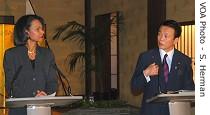2006年VOA标准英语-Rice Discusses North Korean Threat on Asian Tri(在线收听)
By Peter Fedynsky
Washington, DC
20 October 2006
watch North Korea Nuclear report
North Korea's recent nuclear test has raised complex questions involving the possibility of nuclear proliferation, political and military instability, and a refugee crisis. Secretary of State Condoleezza Rice is confronting these issues on her current trip to Japan, South Korea, China and Russia. These countries and the United States were parties to suspended talks with North Korea about its nuclear program.
-----
 Condoleezza Rice and Taro Aso answer reporters' questions during press conference, Wednesday, Oct. 18, 2006 |
||
Shinzo Abe quickly rejected further talk about the issue. "In my opinion, the debate is finished. There is absolutely no division within the cabinet."
Secretary Rice said no one in North Korea or Japan should doubt the United States will honor its mutual defense treaty with Tokyo. "I reaffirm the President's statement of October 9 that the United States has the will and the capability to meet the full range, and I underscore - full range, of its deterrent and security commitments to Japan."
In Seoul, Secretary Rice said the alliance between the United States and South Korea is one of the firm pillars of stability and security on the Korean peninsula.
"I wanted to make certain that in the changed circumstances given the North Korean nuclear test that it was very clear that the United States takes its obligation under our defense arrangements very seriously and will act on those obligations."
The focus of Secretary Rice's current trip is implementation of United Nation's resolution 1718 to prevent North Korean trafficking in nuclear weapons and technologies.
Chinese officials have been inspecting North Korean trucks on the border between the two countries. But Beijing opposes sanctions to enforce the resolution for fear of destabilizing North Korea and triggering a wave of North Korean refugees. Secretary Rice says the United States never anticipated an economic blockade or quarantine against North Korea. Instead, she says the United States wants to scrutinize that country's cargo for illegal shipments and proposes radiation sensors at ports and intelligence sharing about suspicious cargoes.
Pyongyang says U.N. sanctions over its nuclear program would be treated as a "declaration of war" and warns of "merciless blows" against those who violate its sovereignty.